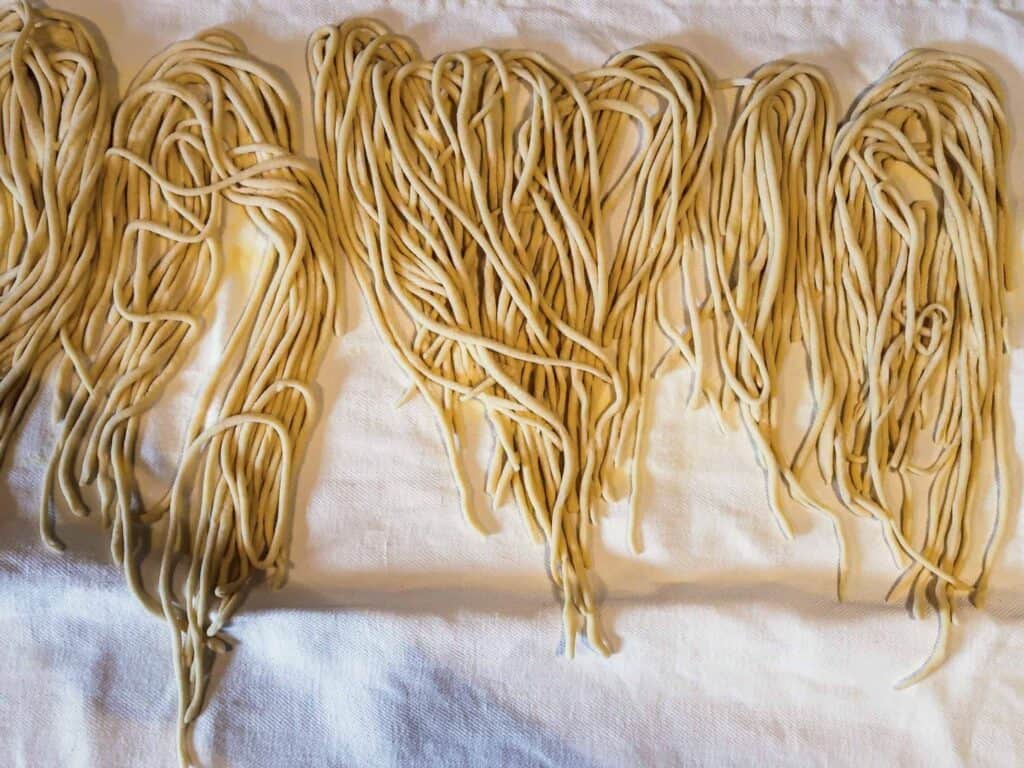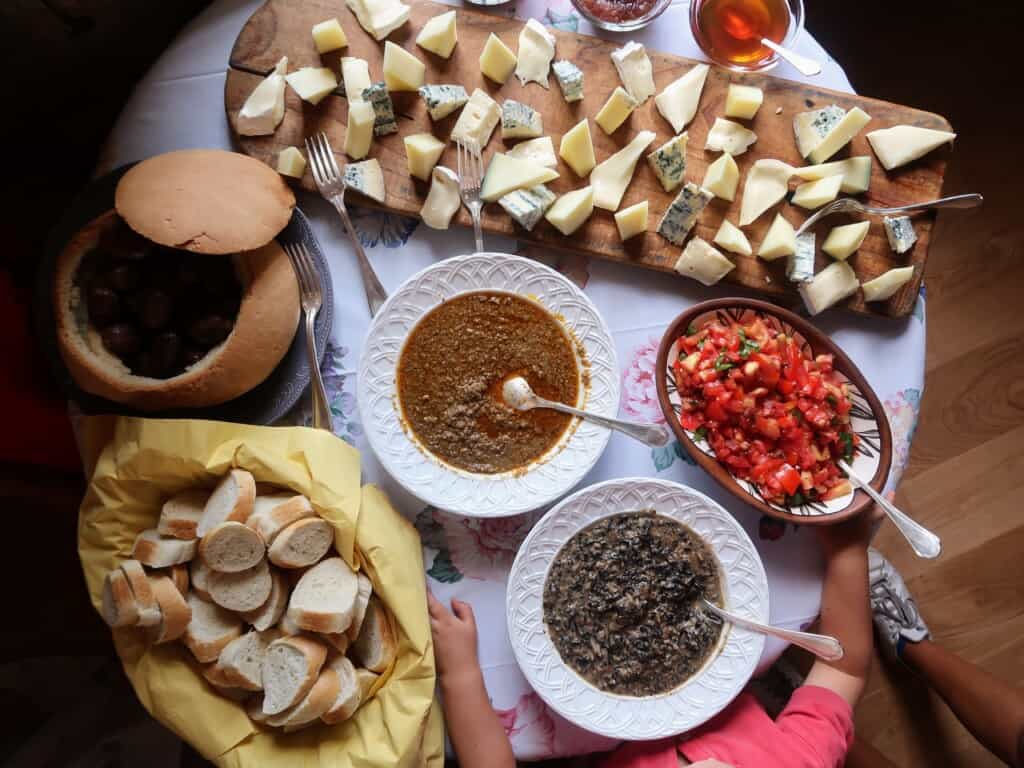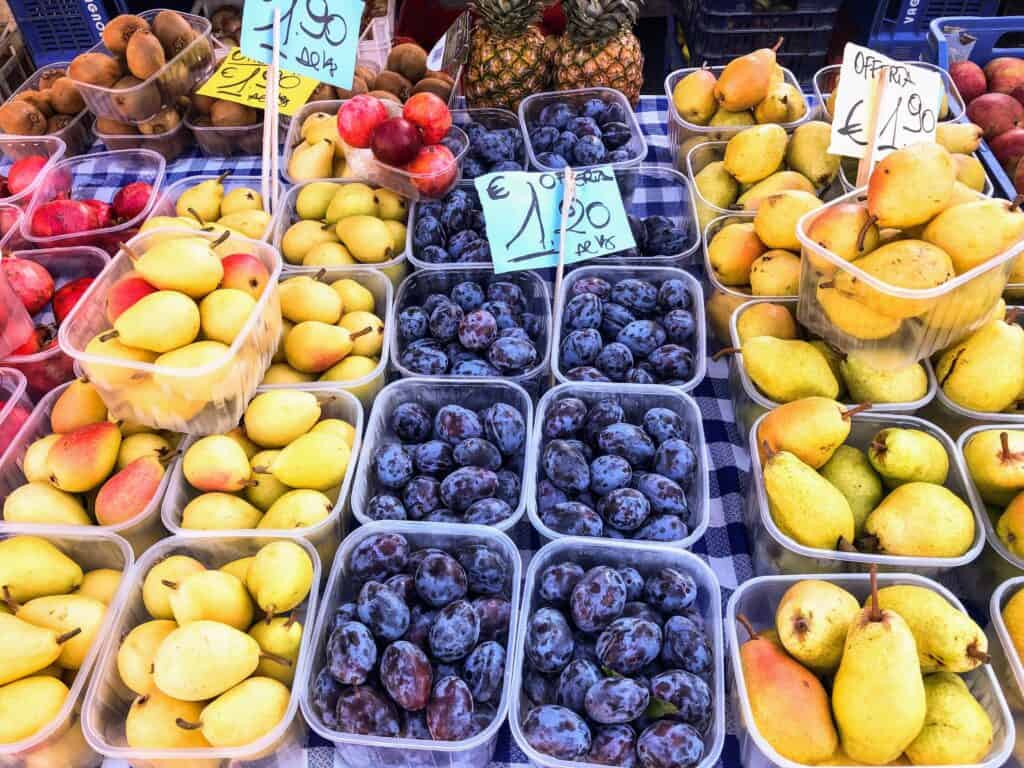Last updated on April 7th, 2024
After being here in Italy for so long I have finally figured out which Italian sayings are actually said/which ones I see more often in movies or books and which ones are more dying out with time.
In this article, I am going to go over some of the most common Italian food expressions that you might hear while you are in Italy.
And you can be sure as a tourist, no one is going to say them to you but just in case you are trying to improve your Italian and are practicing your eavesdropping skills while drooling over a typical three course Italian meal, then these sayings might very well come in handy!
Jump to Section
1. C’entra come i cavoli a merenda
Literally this means “it fits like cabbage for the afternoon snack”, which means that something doesn’t fit well/it’s inappropriate.
2. Sei sempre in mezzo come il prezzemolo
“You are always in the way like parsley!” just as parsley is always added to Italian dishes, even if it really shouldn’t be there. If someone says this, they are really saying that you are butting in, putting your nose where it doesn’t belong – a bad thing!
3. Sono pieno come un uovo
This simply translates to “I am full as an egg” meaning you literally can’t eat anymore because you are so full. Good luck saying this in southern Italy as they won’t take no for an answer when it comes to eating more, more, more!
4. Ha la faccia da pesce lesso
The English equivalent of “he has the face of a boiled fish”, meaning that a person seems quite boring and maybe not someone with whom you would want to make friends.
5. È rigido come un baccalà
If you hear an Italian saying that someone looks “as stiff as a salted codfish”, they mean that the person looks rather uncomfortable or rigid.
6. Avere le mani di pastafrolla/burro
“To have hands made of shortcrust pastry or butter” and just like in English, “to have butterfingers” means to be clumsy and to drop everything.
7. Avere la botte piena e la moglie ubriaca
Literally translating to “have the wine cask and the drunken wife” meaning “to have your cake and eat it too” (and we all know what that means).
8. Rendere pan per focaccia
“To give back bread for focaccia” has a similar meaning to “an eye for an eye”, meaning to pay back for a wrongdoing.
9. Buono come il pane
When you hear someone being referred to as “good as bread” they are saying, they don’t come better than this, very humble, simply the best.
10. Tutto fa brodo
“Everything makes broth” means “every penny counts” referring to the concept that even the smallest thing can add up and amount to something larger in the end.
11. Liscio come l’olio
If something goes “as smooth as oil”, it means it went without any problems or bumps in the road, just as the surface of oil is smooth, without a ripple.
12. A tavola non si invecchia
This phrase meaning “you don’t get old at the table” means that fun is always to be had at the table as long as there is good food and company, no matter the age!
13.Non c’è trippa per gatti
Literally translating to “there is no tripe for cats,” meaning no matter how nicely you ask for something, there is no way you are getting it!
14. Tutto finisce a tarallucci e vino
Meaning “it all ends with biscuits and wine” or “all’s well, ends well.”
15. L’appetito vien mangiando
Meaning “appetite comes with eating”, this expression refers to the idea that people always want more than they have.
16. Al contadino non far sapere quant’è buono il cacio con le pere
“Don’t let the farmer know how good cheese tastes with pears” means you should never share the best kept secrets.
17. Cosa bolla in pentola?
“what is boiling in the pot” is a way of asking what is going on behind closed doors.
18. Fare le nozze coi fichi secchi
“To make a wedding with dried figs” is a way to say that someone is trying to make something happen with next to nothing so it’s nearly an impossible task.
19. Rompere le uova nel paniere
If someone “breaks eggs in the basket” it means they have ruined other’s plans, most usually by mistake, as one might do with eggs in a basket.
20. Essere l’altra metà della mela
“To be the other half of the apple” is to be a soulmate of someone.
21. La mela non cade mai lontana dall’albero
This common expression “the apple doesn’t fall far from the tree” indicates that someone is similar to someone else for a reason (such as a son to a father – like father like son).
22. Parla come mangi
This is one of the more common expressions used translating to ”speak as you eat,” and refers to how you should talk: slowly and calmly, just as you would eat (so that others can understand you).
23. Essere la ciliegina sulla torta
Meaning “the icing on the cake”, this is used to describe the best part of something.
24. Buon cibo. Buon vino. Buon amici
Literally translating to ”Good food. Good wine. Good friends”, this expression is meant to express that all you need in life are the simple things: good food, wine and friends
25. Non tutte le ciambelle escono col buco
“Not all doughnuts come out with a hole” is used when the results are unexpected, just as a cooked donut may not come out of the fryer as expected, with a hole.
26. Nella botte piccola, c’è il vino buono
“Good things come in small packages” is the meaning of this Italian phrase translating to “in small barrels, there is good wine”. It’s used to underline that sometimes things aren’t always what they appear to be, but can be much more valuable or treasured upon a second look.
27. Avere il prosciutto sugli occhi
Literally meaning “to have ham on your eyes”, this phrase is used to point out someone’s carelessness or to refer to something very obvious.
28. Il pesce puzza sempre dalla testa
“The fish always stinks from the head” is used to state that if a situation goes a rye or something is wrong, the person in charge is to blame and no one else.
29. Siamo alla frutta
This means “we have arrived at the fruit (at the end of a meal)”, indicating that no one has any more energy or “we’re done!”
30. Fare polpette di qualcuno
Literally “to make meatballs out of someone” or rather as English speakers might say “to make mincemeat out of someone”.
31. Fare una spaghettata
Literally meaning “to eat spaghetti” but it’s a way that Italians say “let’s gather round for a meal together”.
32. Conoscere i miei polli
When you hear an Italian say he “knows his own chickens”, he means he can predict what someone he knows well is about to say or do or more simply put “I know my stuff”.
33. Due dita di vino e una pedata al medico
This phrase is similar to the meaning of “an apple a day keeps the doctor away” but here, the translation is “two drops of wine and we can kick the doctor out the door”, indicating the importance of wine for good health!
34. Mangiare per vivere e non vivere per mangiare
“Eat to live, don’t live to eat” is a phrase used to underline the importance of being modest and to not do things or consume in excess. One must always try their best to be moderate in life and not overdo it.
35. Una ciliegia tira l’altra
“One cherry leads to another” means exactly that: once you start eating one cherry (or start anything that fits here) it will be hard to stop because it will lead to the next one.
36. Non fare il salame
“Don’t act like a salami” means don’t act like a big old ham, or idiot!
37. Cercare i peli nell’uovo
When you hear an Italian say “to look for hairs in an egg” they are insinuating that someone is a very picky eater, in search of something they will never find on their plate or at the table.
Dig Deeper: You may also like our articles on Italian Food Phrases and Quotes About Italian Food.




